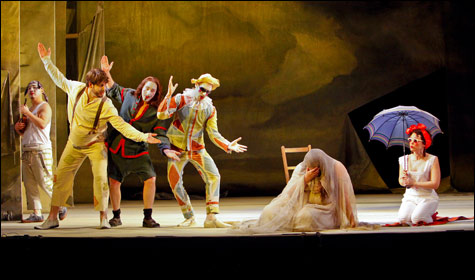
MAKE 'EM LAUGH? Zerbinetta and the commedia troupe try to cheer the abandoned Ariadne. |
Boston Lyric Opera hasn't had much success lately with either its home-grown or its second-hand products, but its latest import — the Welsh National Opera's 2004 production of Ariadne auf Naxos, Richard Strauss's third collaboration with Hugo von Hofmannsthal, his favorite librettist — is a charmer (at the Shubert Theatre through March 23).
Ariadne was originally produced in 1912 as an opera appended to Moliere's comédie-balletLe bourgeois gentilhomme (in which the nouveau-riche hero discovers he's been speaking "prose" all his life), with new incidental music by Strauss. Neither creator was satisfied, and in 1916, Ariadne returned as a one-act opera preceded by an elaborate prologue about a neurasthenic young composer putting on a serious new opera for a wealthy gentleman who has also invited a troupe of commedia dell'arte players for laughs. This insult to high art is aggravated when the Major Domo (here drolly authoritative actor Will LeBow) announces that in order to have the fireworks go off on time, the opera (in which Ariadne is abandoned by Theseus on the isle of Naxos) and the comedy will have to take place simultaneously.
This is a source of both rollicking fun and profound, heartfelt considerations of the nature of music. ("Music is a holy art," the Composer sings.) It's also about art as Gesamstkunstwerk, an inclusive, collaborative synthesis incorporating all the contradictions of Life and Art.
Director Neil Armfield perfectly gauges and maintains the serio-comic tone. His conception (staged here by his assistant Denni Sayers) includes Dale Ferguson's wittily modern backstage (ready for Kiss Me Kate) and a mysteriously cloudy Naxos, with torn curtains (an emblem of Ariadne's shipwreck of a life?) through which the sly and skillful commedia players sneak a peek. At the end, Bacchus descends on a kind of heavenly gangplank to rescue Ariadne and turn her into a constellation (is this the original version of "Stick with me, kid, and I'll make you a star"?), and lighting designer Tim Mitchell invents a dazzling laser-light show evoking Close Encounters of the Third Kind.
Boston Lyric Opera's 1991 Ariadne made a star out of soprano Deborah Voigt in the title role. Although no one in this new production has quite that kind of vocal opulence (who could?), there are some very impressive singers — and none of them is as inert an actor as Voigt was. Marjorie Owens's Ariadne is a vocal powerhouse, and she's hilarious as the prima donna. In the "opera," she reacts with amusing annoyance to the raunchy intrusions of the commedia players. Tenor Brandon Jovanovich (Don José in the Met's new Carmen) returns to BLO as a Bacchus with tireless stentorian pipes and a rich, warm tone. What Ariadne could resist him? The Composer is more complex, and full-voiced Polish-born soprano Edyta Kulczak conveys delicate nuances of passion and naïveté. And as Zerbinetta, who knows both the joys and the regrets of a sexually active life, coloratura Rachele Gilmore, a former graduate student at BU, trills her way into the stratosphere and proves a deft and adorable comedienne.
The orchestra plays with dash and breadth under Erik Nielsen, a former conducting fellow at Tanglewood (he led Kurt Weill's Mahagonny two summers ago) about to make his Met debut. I wish he could also add some rhythmic energy to the nearly half-hour final duet between Ariadne and Bacchus, to give Strauss's gorgeous but static music a little more oomph. And Armfield's good idea of having the two protagonists charily circle the stage goes on too long. These are my only reservations about this thoroughly engaging production.
PS: Speaking of teamwork: kudos to OperaHub for its highly imaginative production of a true rarity, Alexander Zemlinsky's moving one-act, Der Zwerg ("The Dwarf"), in four free (!) performances at the BCA. Everything worked.